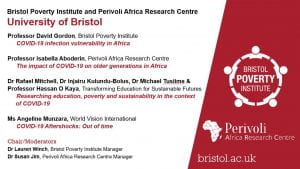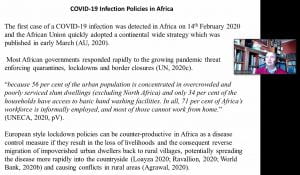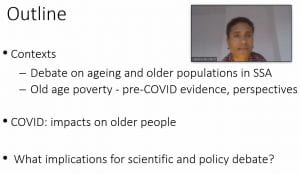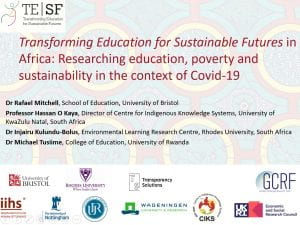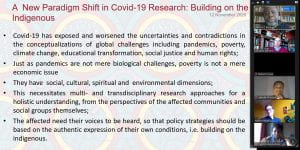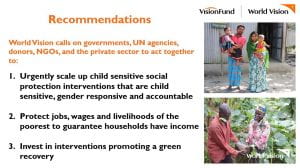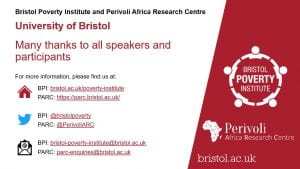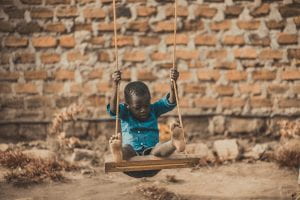Bristol Poverty Institute and Perivoli Africa Research Centre hosted
The poverty and inequality dimensions of COVID-19 in Africa
Thursday 12 November 2020 (online)
On Thursday 12 November the Bristol Poverty Institute (BPI) and Perivoli Africa Research Centre (PARC) co-hosted a webinar exploring the poverty and inequality dimensions of COVID-19 in Africa. This webinar was attended by around 50 participants representing a range of sectors and organisations including international NGOs and academics from around the globe. More than a third of registered attendees were from outside the UK, with almost half of these from African countries including Burkina Faso, Rwanda, Nigeria, South Africa and Kenya.
This webinar provided a broad overview of how COVID-19 has been intersecting with and exacerbating inequalities and poverty in Africa, recognising the huge breadth of challenges, geographies, societies, political and physical environments, and other dimensions of both poverty and COVID-19 across the continent. We were delighted to be joined by a fantastic panel of seven speakers, who gave four thought-provoking presentations. Presentations lasted around 15 minutes each, with a short Q&A following each one.
The slides and recordings from these presentations can be accessed via the BPI website.
Professor David Gordon, COVID-19 infection vulnerability in Africa
The first speaker was Professor David Gordon, Professor of Social Justice and the Director of the Bristol Poverty Institute and Townsend Centre for International Poverty Research at the University of Bristol.
David began by introducing survey microdata from over 50 countries with information on some 3.2 million people, analysis of which found that the COVID-19 crisis is likely to increase the amount of severe poverty, affecting from 10s to 100s of millions of people, depending on duration of the pandemic. He highlighted how evidence from previous twenty-first century epidemics, including Zika, SARA and Ebola, shows us that there is a consistent increase in the inequalities not only during pandemics themselves but also during the subsequent 5 years.
David noted that the situation in Africa is particularly problematic, where concerns relating to population density in poor urban areas, plus a large informally employed population, insufficient handwashing basics, and high rates of underlying health conditions suggested potential for disaster.
He noted, however, that the African Union had adopted a continental strategy promptly in March 2020 including quarantines, lockdowns, border controls, and public health information. This involved a different set of policies and approaches to the European-style lockdowns, which would have had limited effectiveness in many African contexts and may even have been counter-productive. This is one of many illustrative examples of how it cannot be assumed that the policies of the Global North can be transplanted to Africa and other global contexts.
Despite the severe challenges that this pandemic has presented, the next section of David’s presentation highlighted that severe poverty has not prevented an effective fight against the pandemic. He gave examples of how Uganda, Togo, and Rwanda have managed to suppress the outbreak. For example, in Uganda they were able drew upon the experience of a public health system that already knows how to deal with outbreaks, meaning that anti-infection measures were in place four days before the first case arrived. This resulted in only 2,750 cases and only 28 deaths at the time of reporting. This was in stark comparison to the UK, with only a slightly larger population and a vastly larger public expenditure, which had had 40,000 deaths and over one million cases by the end of August.
David was keen to ensure that this success story was balanced by an account of vulnerability, however, indicators of which included crowded living conditions, age, obesity, lack of cleaning supplies, shared/scarce toilet facilities and water sources, and other factors. These factors led to increased contact and risk of spreading disease both through the shared use of resources and facilities but also due to the fact that compliance with social distancing in these situations is difficult if not impossible. David emphasised that governments need to provide money, for loans, essential food, soap, water, cleaning materials to aid compliance, and that local authorities can also have a positive impact through initiatives such as queuing systems and provision of masks.
David concluded his presentation by noting that despite the successes in some quarters there are still desperately challenging times ahead across the continent, including both direct and indirect impacts of COVID-19.
Professor Gordon’s presentation can be viewed in full via the BPI website.
Professor Isabella Aboderin, The impact of COVID-19 on older generations in Africa
The second speaker was Professor Isabella Aboderin, the Director of the Perivoli Africa Research Centre (PARC) at the University of Bristol. Isabella began by highlighting the importance of situating thinking around the impacts and implications of COVID-19 in Africa in the context of the broader discourse on ageing and older populations. She highlighted now Africa is a very ‘young’ continent, but one with a rapidly growing absolute number of older people. There has been little concern to date with the impacts of ageing on the sustainability of systems, whereas the ensuring of wellbeing and rights has been the focus.
Isabella outlined the recent discourse and scholarly trends surrounding older age research, and the general truths that a) later-life poverty reflects exposures in earlier phases of life course (e.g. lack of formal education, ill-health, etc.) and b) there is no one systematic approach to later-life course. She then went on to explore the debate on social protections, and why we are seeing inequalities in older populations.
Isabella went on to highlight that heightened COVID risk among older adults are influenced by a range of factors including lower income, food insecurity, higher prevalence of chronic diseases, compromised capacity for protection against COVID, access and adequacy of health system responsiveness, and restrictions on movement including practical, social and emotional. The tolls these factors take on mental and physical health is considerable and have implications for scientific and policy debate when considering a wider context in sub-Saharan Africa.
She noted how it is imperative to identify priority investments to reduce poverty and inequality. Within that, there is an urgent need to better understand the nature and scope of old age poverty and inequalities. Specifically, how has the COVID crisis impacted age-based multidimensional poverty inequalities and what role have intergenerational dynamics played? How does age interact with other factors (gender, geography, disability, etc.) and, crucially, how is this likely to evolve over medium term?
Isabella concluded by noting the significance of these conceptual and methodological challenges, as well as the important opportunity collectively such challenges present for concerted Africa-led research.
Professor Aboderin’s presentation can be viewed in full via the BPI website.
Professor Hassan O Kaya, Dr Injairu Kulundu-Bolus, Dr Michael Tusiime and Dr Rafael Mitchell, Researching education, poverty and sustainability in the context of COVID-19
The next presentation came from a panel of speakers representing the GCRF research network Transforming Education for Sustainable Futures (TESF), which focuses on socially and environmentally just education for climate action, decent work and sustainable cities. TESF is supporting up to 80 Southern-led projects in Rwanda, Somalia/Somaliland, South Africa and India. The presentation featured four speakers representing several of the programme partners: Professor Hassan O Kaya (University of KwaZulu Nata, South Africa), Dr Injairu Kulundu-Bolus (Rhodes University, South Africa), Dr Michael Tusiime (University of Rwanda, Rwanda), and Dr Rafael Mitchell (University of Bristol, UK), bringing a range of knowledge, expertise and perspectives to this important discussion.
Professor Hassan O Kaya opened the presentation with a short talk on COVID-19 research and paradigm shifts, highlighting how the pandemic has exposed and worsened the uncertainties and contradictions in the conceptualisations of global challenges including pandemics, poverty, climate change, educational transformation, social justice and human rights. He called for a multi- and trans-disciplinary research approaches for a holistic understanding, from the perspectives of the affected communities and social groups themselves.
Hassan observed how Africa’s response to the pandemic in terms of education saw institutions at all levels closing abruptly and moving learning online. This exposed and exacerbated existing socioeconomic inequalities and the digital divide between privileged and underprivileged pupils, students and families. Hassan concluded that there ought to be emphasis laid on self-reliance, and it is critical to build on complementary indigenous knowledge systems.
The second TESF speaker was Dr Injairu Kulundu-Bolus, whose short talk emphasised how the pandemic has exacerbated existing challenges including food security, access to water, and ongoing economic precarity. She also noted not it has also highlighted different dimensions of poverty, including the interconnected concepts of ‘poverty of trust’ and ‘poverty of connectedness’ relating to trust between the government and between communities, felt most starkly in the most unequal countries.
Injairu then went on to highlight how different community action networks have responded to these related concerns. For example, some have been hiding in plain sight, acting in meaningful ways despite a lack of government support such as community food kitchens which fulfilled a dire need particularly when the schools closed taking with them a vital source of nutrition for many children.
Injairu observed how the pandemic had raised many questions, such as how can you maintain proper hand-washing hygiene when water is scarce, what is needed next in order to adequately support communities, and how do we foster an embodied local engagement. She concluded by commenting on how the pandemic has created a space for young people to assert their futures and look beyond the paradigm of charity. The question of how to ‘build back better’ and foster social solidarity by rewiring our ways of working has a ready if incomplete answer in community action networks. These have rich potential to support deep reflection on which we can build to go forward.
The third speaker from the TESF network was Dr Michael Tusiime, who introduced two aspects of his work in Rwanda. Firstly his work with communities to identify the most vulnerable families who have not been able to access remote learning, and the measures taken to try and remedy this. He also highlighted the perpetual problem of ‘catching up’ and associated continued inequalities for these children, and how teachers’ capacity to provide remedial teaching when schools resume is of great concern.
Michael then went on to introduce his subsequent work which examines opportunities and challenges communities experience as they negotiate their children’s continuity of learning as they encounter wider issues surrounding sustainability. For example, how can existing local community structures be empowered to proactively support children’s learning during and post COVID-19? How best can they tap into the local resources they have? He concluded that it remains to be determined what is needed for education institutions to reopen safely for disadvantaged groups, and how inequalities can best be tackled.
The final TESF participant was Dr Rafael Mitchell. Due to time constraints he was unable to share his presentation during the webinar; however, it is available to view via the BPI website alongside recordings of all the presentations.
Ms Angeline Munzara, COVID-19 Aftershocks: Out of time
The final speaker was World Vision’s Angeline Munzara. Angeline began by highlighting how there has been a clear loss of income and reduced access to food for most vulnerable, and how this pandemic could reverse progress made towards the 2030 agenda and the SDGs irreversibly damaging lives. She introduced work from World Vision’s rapid assessment in 24 countries which suggests that millions of children will go hungry and be forced to beg. She gave examples of especially acute problems which have been observed in the Democratic Republic of Congo, how desert locusts have ruined crops in Ethiopia, Somalia, and Kenya, an increased risk of sexual violence against children, and how the resurgence of Ebola in some regions has complicated the response to COVID-19.
Angeline gave a stark warning that the basic right to provide needs of children is being inhibited; COVID-19 is curtailing caregivers’ ability to look after children. The world is also edging towards another global food crisis with rising food prices and a pronounced loss of income for many small businesses in Africa, and urgent action is required because this leaves the wellbeing of children at major risk, including a hugely increased incidence of child marriage.
In the final section of her presentation Angeline introduced World Vision’s key recommendations in response to these challenges, as shown in the below slide. She concluded that systemic, holistic, integrated approaches to economic recovery are required, and that it is crucial to understand how to learn from the pandemic to shape systems and deliver services to most vulnerable communities and children.
Angeline’s presentation can be viewed in full via the BPI website, and she has also written a fantastic blog piece reflecting on the discussions in this webinar which is available via this link. The full World Vision report cited in this presentation is available on their website.
Conclusion
This webinar therefore covered a range of interesting and important topics, and also generated engaged discussion through the Q&A sections. Clearly COVID-19 is having wide ranging, complex, and devastating impacts on communities across the African continent and those in poverty will be disproportionally affected, exacerbating existing socioeconomic and ethnic inequalities. Hopefully by coming together and learning about different perspectives, approaches and challenges we can be better situated to individually and collectively make a positive impact. Both the Bristol Poverty Institute and Perivoli Africa Research Centre are keen to keep these discussions going, and to explore ways to tackle the challenges and inequalities exposed and exacerbated by this pandemic. We encourage participants – and blog readers – to get in touch if you are interested in future collaboration.
Recordings of all presentations are available on the via the BPI website, alongside slides from presentations where speakers have given us permission to share these.
Authors: Lauren Winch (BPI) and Elliot James (PARC)

